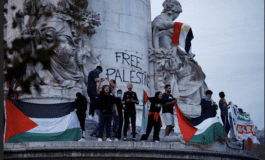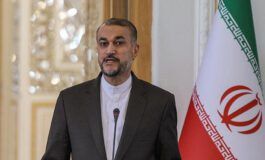
WASHINGTON (IPS) — Two years after HAMAS was isolated almost unanimously by the international community following its victory in Palestinian parliamentary elections, the militant Islamist group has repeatedly proved that it can disrupt U.S. President George W. Bush’s plans for a decisive agreement on Palestinian-Israeli peace by the end of this year.
The upsurge in violence in Gaza over the last few months has underscored the stark reality on the ground: the repeated rocket attacks from militants in Gaza and the Israeli military response have only undermined the U.S.-backed Annapolis talks between Israel and the Palestine Authority aimed at creating a Palestinian state.
While the White House continues to publicly rule out direct negotiations with HAMAS until it renounces violence and accepts Israel’s right to exist, the group’s ability to exploit the consequences of its isolation appear to have forced Washington to soften its stance.
In order to achieve any sort of peace deal before its term expires, the Bush administration appears willing to offer at least tacit support for mediation between Israel and HAMAS militants.
And now, any possible hope for successful peace talks rests on three distinct sets of negotiations: the U.S.-backed Annapolis initiative, negotiations mediated by Egypt to stop Gaza rocket attacks, and an effort to reconcile Mahmoud Abbas’ Fatah party with HAMAS, known as the Yemeni Initiative.
The last three months has seen the Palestinian polity split even further, and the main beneficiary has been HAMAS. The nine-month blockade of Gaza by Israel, HAMAS’ breach of the Rafah border crossing with Egypt in January, and the aftermath of the Israeli incursion into Gaza that left more than 130 Palestinians dead, not to mention the bombing attack in West Jerusalem that resulted in the deaths of eight Israeli religious students, have weakened Abbas considerably and have bolstered HAMAS.
“The HAMAS spoiler potential is not solely or even principally about its ability to deploy violence. It is also about the credibility and legitimacy of a process that excludes the party that polled most votes in Palestinian elections,” wrote former Israeli peace negotiator Daniel Levy.
A poll conducted last month by the Palestinian Centre for Policy and Survey Research indicates a 10-percent shift of support towards HAMAS, not only from Palestinian respondents in Gaza, which is already under the control of the Islamist group, but also in the West Bank, where Abbas’s Fatah party governs.
The poll also shows that while two-thirds of Palestinians support a two-state solution to the conflict with Israel, those surveyed said they would elect HAMAS leader Ismael Haniyeh as president over Abbas, reversing a December poll.
HAMAS won a majority of seats in the Palestinian parliament in January 2006 and Abbas formed a coalition government with the group, which the U.S. designates as a terrorist organization for its attacks on Israel. In June last year, HAMAS seized control of the Gaza Strip and the coalition with Abbas’s Fatah movement fell apart. Abbas has since governed the West Bank from the city of Ramallah.
As a result of Israel’s inability to pacify Gaza with military force, there have emerged calls within the Washington Beltway as well as from former Israeli politicians to negotiate with HAMAS.
“Locked in a self-imposed conceptual paralysis that does not allow for a non-military solution, Israel refuses to see that HAMAS’ rocket attacks on Israeli territory are not intended to draw Israel into an invasion,” wrote Shlomo Ben-Ami, a former Israeli foreign minister, in the pages of the Beirut Daily Star.
“Instead, they are an attempt to establish a new deterrent against Israel that would force it to agree to a ceasefire,” he said.
The Israeli Policy Forum, a dovish Israeli peace advocacy group based in Washington, sent a letter to Secretary of State Condoleezza Rice last week calling for the White House to bring HAMAS into the process: “It is impossible to achieve an agreement on any of the key issues — including the release of Corporal Shalit — without engaging HAMAS through some means, simply because HAMAS is the governing authority in Gaza.”
U.S.-backed talks have stalled, the result of violence in Gaza, but also because of broken promises on both sides. At the Annapolis peace conference in November, Israel and Fatah head Mahmoud Abbas agreed to restart talks based on the 2003 “road map” peace plan, which calls for Israel to halt all settlement activity and for the Palestinian Authority to rein in militants.
It received another setback this week, when shortly after Rice’s departure from Israel, the Jerusalem municipal authority announced plans to build 600 new houses in Pisgat Zeev, a settlement in an area of the occupied West Bank that Israel considers part of the city.
In addition, the ultra-Orthodox Shas party said Prime Minister Ehud Olmert had promised to build 800 more homes in Betar Ilit, a town of strictly Orthodox Jews near Jerusalem that is one of the fastest-growing settlements in the West Bank.
While in Amman, Rice responded: “We continue to state America’s position that settlement activity should stop, that its expansion should stop, that it is indeed not consistent with the Roadmap obligations.”
Israel does not consider expansion in East Jerusalem to be settlement activity because it was annexed by Israel after the 1967 war. The international community has not recognized Israel’s annexation.
“It is difficult to understand why an otherwise apparently sensible and learned American secretary of state can live in a fantasy world when it comes to understanding the real significance of Israeli settlements built on occupied Palestinian land,” wrote Beirut Daily Star editor Rami Khoury in his weekly column.
“One reason why so many Palestinians have lost hope in a negotiated peace, and have instead supported HAMAS and others who fight Israel militarily, is the continued settlement activity by Israel and apparent acquiescence by the United States and the rest of the world.”
Olmert, politically embattled because of corruption scandals and an inconclusive 2006 war with Lebanon’s Hizbullah militants, depends on Shas, which has 12 seats in the Israeli parliament, to form a parliamentary majority in his coalition government. The move appears aimed at assuaging concerns from Shas leaders, who have made repeated threats to leave his government over disputes in the Israeli-Palestinian talks. Israel will continue to build in East Jerusalem and in heavily-populated Jewish areas of the West Bank that Israel intends to keep in a final peace agreement.
But the more pressing issue for many Palestinians remains the humanitarian costs of HAMAS’ isolation. At what point will the group’s intransigence prove too much of a burden for Gazans, and what will that mean for HAMAS’ political future?





Leave a Reply